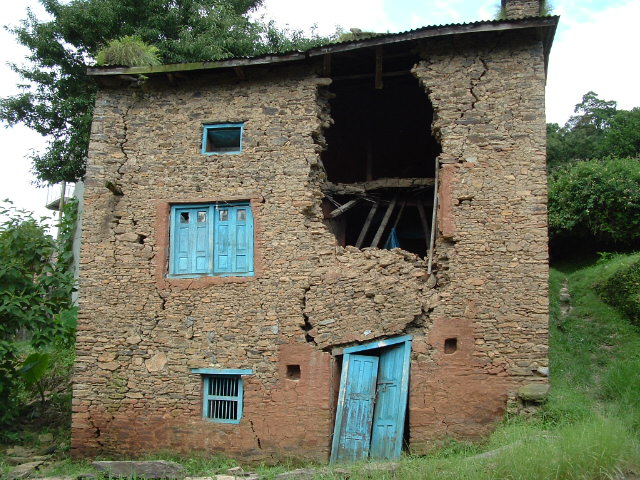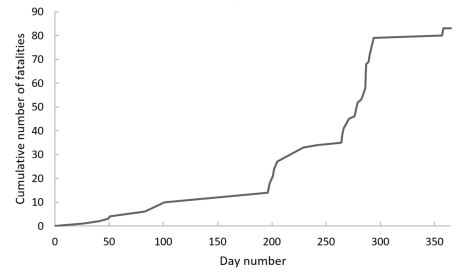17 April 2018
Landslides in Nepal: the need for a national agency?
Posted by Dave Petley

A house ruined by one of the many landslides in Nepal
Landslides in Nepal: the need for a national agency?
In a report in Kantipur, various Nepali and Japanese experts are calling for the setting up of a national agency to take responsibility for the management of landslides:-
“Following the adverse impacts of landslide on diverse areas like infrastructure, arable land, human settlements and lives, disaster experts from Nepal and Japan have jointly proposed a Landslide Disaster Management Centre. Disaster experts have drawn the attention of state bodies in a recent five-point declaration on how the government should be prioritising its efforts for saving property and lives to landslides.”
The report points out that over the last year landslides have been the leading cause of disaster induced fatalities, accounting for 29% of the total. I recorded a total 83 fatalities in 2017 – interestingly the government statistics recorded 70 deaths. I suspect that the difference is that my data includes both rockfalls and landslides associated with construction activities. This is the cumulative total number of landslide fatalities in 2017 for Nepal:-

Cumulative total number of landslides in Nepal in 2017.
.
The bunching of the landslides in the early part of the second half of the year is, as usual, clear. This is the effect of the summer monsoon, as I have noted previously. This period is just around the corner, and more losses from landslides are sadly inevitable.
It is hard to argue with the need to manage landslides better in Nepal. The high losses from landslides are partly the result of a landscape-climate system that makes mass movements inevitable, but they are also largely due to poor land use, planning and construction practices. Setting up a national agency is a good first step, but it can only work if it is given the resources and the tools to effect change. That requires good people (Nepal is blessed with good levels of expertise in landslides in the public and private sectors), investment and political will. I am unconvinced that the latter is there. Until that is the case then this level of loss will continue.


 Dave Petley is the Vice-Chancellor of the University of Hull in the United Kingdom. His blog provides commentary and analysis of landslide events occurring worldwide, including the landslides themselves, latest research, and conferences and meetings.
Dave Petley is the Vice-Chancellor of the University of Hull in the United Kingdom. His blog provides commentary and analysis of landslide events occurring worldwide, including the landslides themselves, latest research, and conferences and meetings.
While I fully agree that the landslide issue in Nepal needs far greater consideration, I am extremely doubtful, on the basis of my experiences having worked in Nepal for 24 years, as to the efficacy of yet another new agency. I have seen such initiatives come and go. You are absolutely correct in that there must be the political will from the highest level down to address such issues. But these are but one of a set of hazards and issues that beset the country and its incredibly weak government and governance. Landslides are part of the mountain system and unless there is a greater awareness of the sensitivities of that system, one ends up with a monolithic approach to an issue (i.e. landslides in isolation). There are better ways of utilising the expertise within the technical community than establishing a new agency and some of these issues are being looked at, at very senior levels within the government and international donor funding bodies, some of which I am personally involved with. There are already too many agencies and government departments in country with an increasing complexity afforded by the new federalisation of government. I am all for dealing with landslides but within the context of related issues and utilising existing structures that can be streamlined and refined rather than just being added to.
I have done my masters research on Designing conceptual structure for the national landslide management system for Nepal. In my research, I have pointed out stakeholders who can contribute to landslide information and also the users and providers of landslide data in Nepal. If somebody is interested in reading the thesis please follow the link below.
https://www.researchgate.net/publication/316877839_Designing_an_Approach_for_Sustainable_Landslide_Inventory_Mapping_in_Nepal
The Kantipur news seems to be about restructuring (or replacing) DWIDM under the same Nepal-Japan cooperation model to (by) an center to focus on landslides that seemingly are more destructive than the water-related phenomena. Such development is of course welcome, there is high possibility for its materialization and it will definitely yield fruits. If the talk is about a national agency looking after landslides, in a broad sense, a totally new organization should be planned such that it will be capable to engage and accommodate funding and expertise of as many international institutions and individuals as possible, and be free from unnecessary interventions such as political, or international but locally influential for-the-profit agencies. there is clearly a need for such organization that can fully utilize the “good levels of expertise in landslides in the public and private sectors” recognized by David and ensure that the landslide (including floods etc.) management issue is handled as a part of a broad mountain-related system rather than an isolated one as emphasized by John. Thanks to international cooperative efforts, Nepal has made a lot of progress in research in earth and environment-related issues (please see a summary of internationally visible research for the 2004-2013 period here: http://rdcu.be/wDf9), and this is being continued as shown by the work of Meena, but the problem lies in the fact that very little of that knowledge is used when it comes to addressing the landslide etc. management issues.